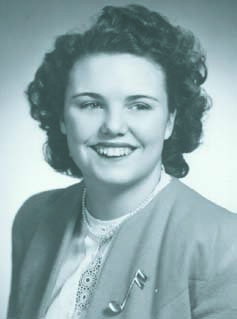
The war started when I was eleven years old, on December 7th, 1941. I was walking home. It was a Sunday, and I was coming back from church. Some boy on a bicycle, a kid that was in school with me, told me that we were at war. I didn't believe him but when I got home I found out it was true.
During the war, we saved foil. We didn't have aluminum foil in those days, but we saved tin foil, off candy bars or whatever. We collected big balls of it. We saved tin cans, and we had a tin can house at the school that they built. We took them to school and they built this little shed out of cans. And we had cigarettes. Of course, I didn't smoke, but my mother and my father did, and cigarettes were rationed. Shoes were rationed. I think you could only have two pairs a year. Of course, by that time I was eleven and our feet weren't growing so fast, but if you had babies, that must have been really hard.
My sister and I planted a Victory Garden down at the creek. I don't recall what we grew--I don't even know if it was edible--but we were growing it anyway. We had a car back then, a coupe. There was gasoline rationing, and I believe we had an A-card, the most common kind of card that you got for gasoline. I don't know whether coffee was rationed or not, but I think it was. Nylons were, but my sister and I were not old enough to wear nylons, not when the war started at any rate.
I don't remember any rationing of food. There was a little store on the corner, a little grocery store, and we'd get on our skates and skate down there and twirl around the pole and come back up to the house. Chickens in those days were fresh, and they had plucked them, but they'd have some pin feathers, and I remember the little fire came out of this pipe, and they would singe the pin feathers on the chickens. And when you went in and got something, they would give you liver for your cat, or they would even give the kids a hotdog, and we'd chew on the hotdog as we were going home. So I don't think rationing affected us too much, other than we were aware of it because of all the saving we were doing.
My mother knitted turtleneck sweaters for the Coast Guard, and she taught us to knit squares of a certain size. All you did was knit squares and then somebody, somewhere else, put them together and made afghans out of them. That's how I learned to knit, from doing those.

I remember blackout curtains. Because I lived in California, we had the blackout curtains so that the light wouldn't show through. And another thing I do remember about the war is two of my very, very dearest girlfriends. Until this day I could cry about it. One was Chieko Nagatoshi and the other one was Yukiko Iwasa. And they had to go off to the camps that they had for Japanese-Americans. It was so terrible. Chieko gave me a doll, a Japanese doll which unfortunately I don't have anymore. I wish I did because I really valued that.
Belmont was what they called "restricted" in those days. You had to be Anglo-Saxon white to live in Belmont. But the Japanese had beautiful gardens, and they grew chrysanthemums and other flowers that they sold to the floral shops. Why Chieko and Yukiko were in my class, I'm not sure, but we didn't have that many schools so they ended up going to Belmont.
I got a chance to say goodbye to them, and then I never ever heard from them again. I have wondered over the years how they were, or where they were. I would love to meet them if they are still alive. One would be my age. But you know, in one place I lived the Japanese community was so small that they knew where all the other Japanese were, and the names did not ring a bell with whomever I talked to. They didn't know of them. It's sad. Even with all the propaganda we had about the Japanese and the Germans, I never hated anybody.
I was still in Belmont when the war ended in 1945. And in 1948 I graduated from high school. I remember graduation well. When I was in high school, we had a choral club called the Treble Clef. Mr. Carrington was the music teacher, and I was a member of the Treble Clef. They only had fourteen of us each year. It wasn't a big thing, but we really practiced, and we really sang. We sang all over the place. One time, we went to a veteran's hospital and sang for these veterans in their bathrobes. One of the songs we sang was "My Buddy." Oi vey! They got up and a lot of them walked out. They had buddies or friends that had died in the war. Some were blown up next to them and some killed in other ways. So I can understand why they would have left. I can't blame them.